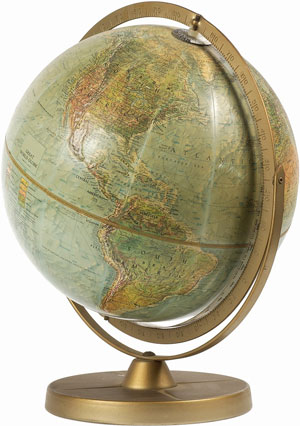Pitt Launching World History Center
 In recognition of the interconnections of human history, the University of Pittsburgh is opening a new World History Center committed to research, teaching, and international collaboration, with the intention of affecting future global policies and practices. The University’s Department of History in the School of Arts and Sciences will host an opening celebration and program to launch Pitt’s new center from 4 to 5:30 p.m. Oct. 16 in the Frick Fine Arts Auditorium. A reception will follow.
In recognition of the interconnections of human history, the University of Pittsburgh is opening a new World History Center committed to research, teaching, and international collaboration, with the intention of affecting future global policies and practices. The University’s Department of History in the School of Arts and Sciences will host an opening celebration and program to launch Pitt’s new center from 4 to 5:30 p.m. Oct. 16 in the Frick Fine Arts Auditorium. A reception will follow.
Patrick Manning, University of Pittsburgh Andrew W. Mellon Professor of World History and director of the World History Center, will give the keynote address, titled “World History and the Global Organization of Knowledge.”
Other speakers will discuss the connections that the new center will have within the University. Presenters are Marcus Rediker, professor and chair of Pitt’s history department; N. John Cooper, the Bettye J. and Ralph E. Bailey Dean of the School of Arts and Sciences at Pitt; Lawrence Feick, director of Pitt’s University Center for International Studies (UCIS) and acting director of its Global Studies Program; David Kalivas, a member of the World History Network board of directors; and Shingo Minamizuka, visiting scholar in Pitt’s new center, president of the Asian Association of World Historians, and founder and director of the Research Institute of World History in Tokyo.
Set within Pitt’s Department of History, the new World History Center draws on the University’s tradition of employing international and interdisciplinary studies to address key issues in the field of history and, more broadly, in the academy, with the goal of meeting today’s need for global historical analysis.
A renowned scholar on the economic history of Africa, Manning also is a specialist in world history. His research has focused on demographic history (the African slave trade), the social and cultural history of francophone Africa, global migration, the African diaspora as a dimension of global history, and an overview of the world history field. His latest project is an interdisciplinary history of early humanity.
Manning served as vice president of the Teaching Division of the American Historical Association from 2004 to 2006, and now serves as president of the World History Network, Inc., a nonprofit organization fostering research in world history, with whom Pitt’s new center will collaborate. Before joining Pitt in 2006, Manning directed the World History Center at Northeastern University from 1994 to 2004. He earned a BS degree in chemistry in 1963 at the California Institute of Technology and an MS degree in history in 1966, an MS degree in economics in 1967, and a PhD degree in history in 1969, all at the University of Wisconsin-Madison.
In addition to the history department, the center is affiliated with Pitt’s Global Studies Program and UCIS, which encompasses four federally funded National Resource Centers: the Asian Studies Center, the European Union Center of Excellence and European Studies Center, the Center for Latin American Studies, and the Center for Russian and East European Studies. The World History Center links global and regional studies through collaboration with these centers, as well as with Pitt’s African Studies Program and the International Business Center, part of the Joseph M. Katz Graduate School of Business.
For more information, contact worldhis@pitt.edu or visit www.worldhistory.pitt.edu.
Other Stories From This Issue
On the Freedom Road

Follow a group of Pitt students on the Returning to the Roots of Civil Rights bus tour, a nine-day, 2,300-mile journey crisscrossing five states.
Day 1: The Awakening
Day 2: Deep Impressions
Day 3: Music, Montgomery, and More
Day 4: Looking Back, Looking Forward
Day 5: Learning to Remember
Day 6: The Mountaintop
Day 7: Slavery and Beyond
Day 8: Lessons to Bring Home
Day 9: Final Lessons

